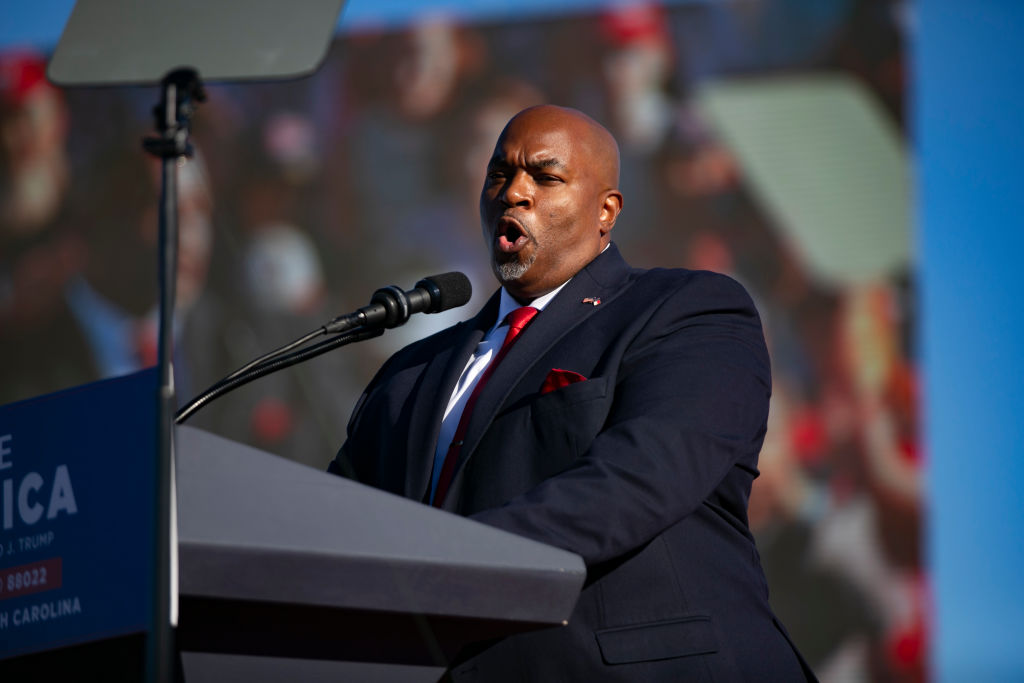Dale Folwell wants to become the CEO of the largest business in the state of North Carolina. At least that’s how he describes his campaign for governor.
A Quaker and accountant first elected to the North Carolina House of Representatives in 2004 and now in his second term as state treasurer, Folwell received more statewide votes in 2020 than Donald Trump, Sen. Thom Tillis, and state Attorney General Josh Stein, now the presumptive Democratic nominee for governor.
But he’ll face stiff primary competition from Lt. Gov. Mark Robinson, a culture warrior and Donald Trump ally with a history of bankruptcies, tax troubles, and controversial comments.
Robinson formally announced his campaign on Saturday at a rally at Ace Speedway in Alamance County—a nod to his Greensboro roots and a throwback to the anti-lockdown politics of yesteryear (Gov. Roy Cooper ordered the speedway closed during pandemic lockdowns in 2020 after large events there). Virtually unknown until his viral comments about gun rights at a Greensboro City Council meeting propelled him to Fox News fame and a successful 2020 run for lieutenant governor, Robinson is beloved by the Trump base. He has a commanding lead in early primary polling, endorsements from prominent republicans such as Sen. Ted Budd and Rep. Dan Bishop, and a robust small-dollar fundraising operation.
But the same qualities that make Robinson electrifying to primary voters could come back to bite him in the general. He has often expressed his socially conservative views in inflammatory terms, decrying left-wing “blue-haired freaks,” describing homosexuality as “filth” and the rainbow pride flag as “a direct spit in the face of God Almighty,” mocking the anthem of the Civil Rights Movement, and emphasizing that God called “David, not Davita” to take on Goliath. Before becoming lieutenant governor, Robinson, who is black, embraced antisemitic conspiracy theories, writing on Facebook that Marvel’s Black Panther character was “created by an agnostic Jew and put to film by [a] satanic marxist … to pull the shekels out of your Schvartze pockets.”
Robinson’s announcement video struck a more positive tone, and he delivered a polished Republican response to Gov. Roy Cooper’s “State of the State” address earlier this year, showing he has the capacity to speak like a more conventional politician. But some Republicans worry that his rhetorical firebombs could be a bridge too far for suburban swing voters next November.
The GOP holds enough power elsewhere in the state—including supermajorities in the General Assembly and a majority on the state Supreme Court—that acquiescing to the base and handing the gubernatorial nomination to a candidate who may lack general-election appeal is an acceptable risk. Democrats have no such luxury. They have rallied around Josh Stein, the attorney general, who announced his campaign in January. (Most elected Democrats in the state have endorsed him, though Cooper has stayed above the fray for now.)
Stein, now in his second term as state attorney general, is following a well-trod path to the Democratic nomination. The term-limited Cooper was attorney general for 16 years before running for governor, and fellow Democrat Mike Easley also served as attorney general prior to his two gubernatorial terms in the early 2000s.
Even as the state has become redder in recent years, Democrats have kept a stranglehold on those two offices in particular, winning seven of the last eight gubernatorial elections (and, somewhat remarkably, every attorney general election since 1900). Some of that may be psychological, with voters approaching state campaigns differently than national ones. But money plays a part too: In 2020, Cooper outspent his opponent by 4-1, and Stein outspent his 10-to-1.
Even if Robinson is a better fundraiser than past candidates, as some Republicans hope, precedent suggests he’ll still end up being outraised and outspent by Stein—especially since no U.S. Senate election in the state will suck donors’ dollars elsewhere this cycle.
Stein developed a liberal record as attorney general, but he’s also worked on issues with cross-partisan appeal, such as the opioid crisis. And while Robinson is already implicitly impugning Stein for being an out-of-touch, upper-crust Ivy-Leaguer, that may not matter if Stein can define Robinson as an embarrassing extremist.
Not that that will be easy. Stein “has a real, serious fight on his hands,” said a former Democratic legislator who supports him. “He’s going to have to disqualify Robinson—it’s going to be, burn him to the ground from day one.”
In Folwell’s view, North Carolinians deserve a better option—and he is determined not to “underestimate or mischaracterize” them.
He nodded to one of North Carolina’s most famous sons, actor Andry Griffith, who portrayed Sheriff Andy Taylor in his eponymous 1960s television show.
“The governor employs more people and buys more light bulbs and tires and paper towels than anyone else in the state,” Folwell said. “And I don’t think that Republican primary voters want Ernest T. Bass as a governor.” (Ernest T. Bass was a character on The Andy Griffith Show with a penchant for throwing rocks at windows.) “I think they want somebody more like Sheriff Taylor, who actually has to solve problems.”
“People just want to be spoken to like adults,” he said.






Please note that we at The Dispatch hold ourselves, our work, and our commenters to a higher standard than other places on the internet. We welcome comments that foster genuine debate or discussion—including comments critical of us or our work—but responses that include ad hominem attacks on fellow Dispatch members or are intended to stoke fear and anger may be moderated.
With your membership, you only have the ability to comment on The Morning Dispatch articles. Consider upgrading to join the conversation everywhere.